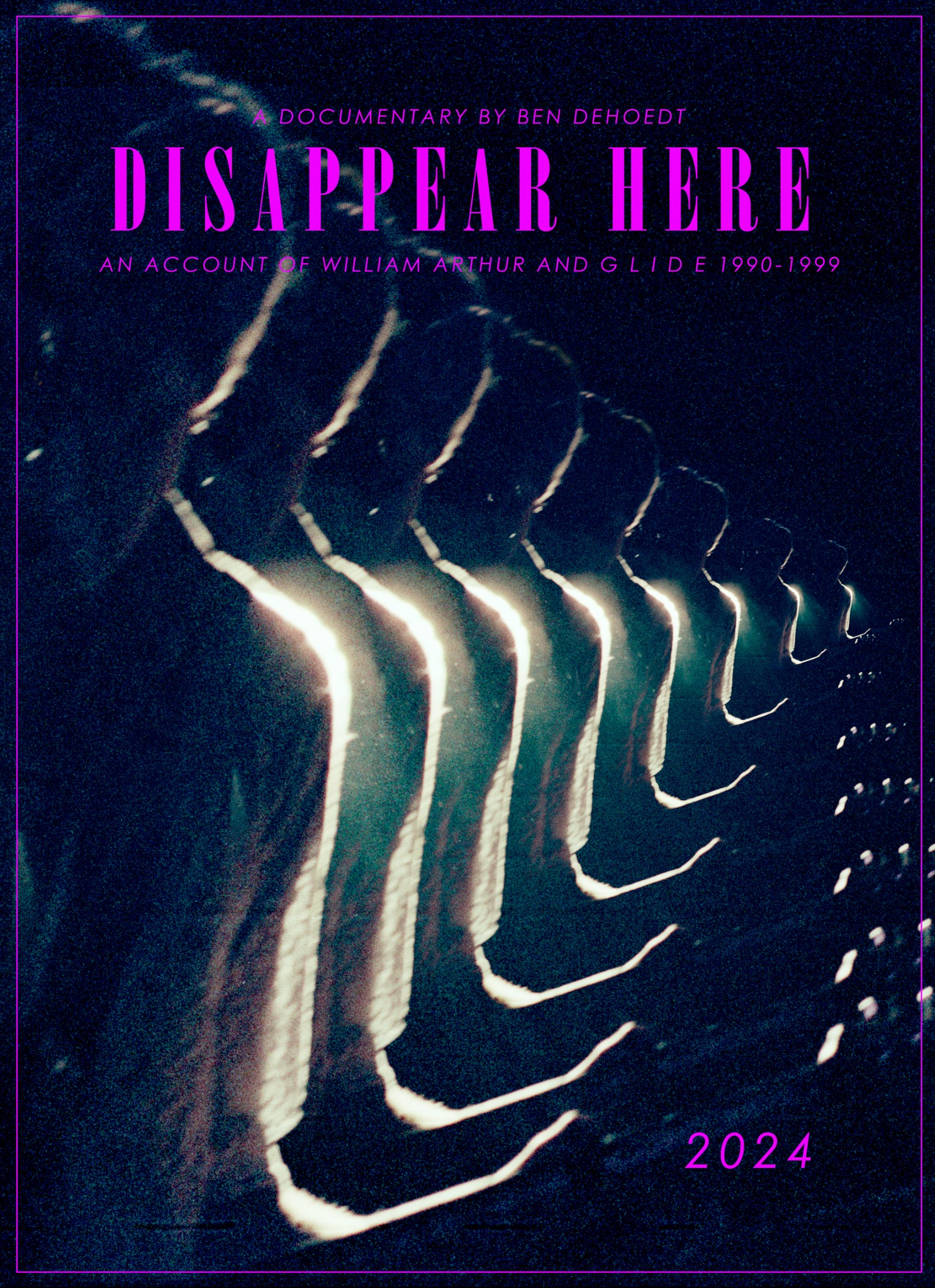If you look up “could-a-been/should-a-been” in the dictionary of Australian ’90s indie rock slang, there will be a picture of Glide. (And probably one of The Welcome Mat, too, but that’s another story for another time.)
I remember seeing the band early in their career and being swept up by their sound – the angular jangle of the Flying Nun stable (Straitjacket Fits, The Chills); the glorious gloom of certain ’80s UK indie acts (House Of Love, The Auteurs); the sinew and swagger of ’90s US alternative bands such as Buffalo Tom and Afghan Whigs.
But at the same time, they were something totally their own, in no small measure because of William Arthur’s poetic songwriting and passionate delivery.

I interviewed Arthur in 1991 for Sydney street-press paper Drum Media, when Glide were still recording their debut EP. He was so quietly spoken that I was worried his words wouldn’t make any impression on my tape recorder.
“I never even really wanted to be a frontman,” he told me.
But beneath that reserved demeanour was burning ambition and a confidence in his own talent.
An early press release for the band stated: “Glide aren’t interested in slavishly following the inner-city line or aping overseas trends. Sydney needs an intelligent guitar band prepared to shake things up. Glide are the band to do it.”
In our interview, he was dismissive of the generally accepted path for Australian bands back then, going around and around the pub circuit for years to pay your dues before someone would notice.
“I’m from an English background,” he said. “And over there bands can happen very quickly. If you’re good and you’re hot, then people encourage you and they don’t say, ‘Well, you’re good, but give it a couple of years and slog your guts out first.’”
By the metric of commercial success, Glide didn’t make it. The big record deal and widespread acclaim that William hoped for – and that Glide’s devoted fans and their admirers among the ranks of other Sydney bands expected – never eventuated. You could say it was stubbornness, tensions between band members, drug use, just plain bad luck, or a combination of all the above.
The sad full-stop to their career, which spanned three albums and a clutch of EPs and singles, came in August 1999, when Arthur died from an accidental drug overdose at the age of 33.
Disappear Here, a new documentary about the band from film-maker Ben deHoedt, reveals as much about the ’90s Australian alternative scene in general as it does about Glide. Self-funded, with deHoedt acting as writer, director, producer, editor and cameraman, it’s also beautifully shot, with Sydney having a starring role, as dreamy images of the harbour, the bridge and inner-city streets fill the screen.
It features interviews with band members from the group’s various incarnations, and a few of them repeat the line, “If you didn’t like William then you were an arsehole.” He is variously described as sweet, kind, sensitive, unworldly, clumsy, accident-prone and a perfectionist. One interviewee says, “I think of him as a young foal.”
Original guitarist Tim Scott, who is brutally honest about his own drug use that resulted in him being asked to leave the band, says, “He was seen as someone who had to be looked after a bit.”
But Arthur also had a clear vision and a hard-headedness that meant he rejected record deals that he considered not up to scratch. Various members remember offers of between $30,000 and $60,000 being turned down.
In the film, Tim Rogers of You Am I says, “He was a mystery to me, and I liked that about him.” And Peter Fenton from Crow adds, “He was aware of himself to the point of being too aware.”
Some may say Arthur sabotaged himself, but Rogers, Fenton and Jamie Hutchings from Bluebottle Kiss – whose bands all navigated their own highs and lows growing up in Sydney’s ’90s indie scene – all have cautionary things to say about that time. There were traps to either fall into, actively avoid, or fortuitously miss, whether that was drug habits, bad record deals, personality clashes or musical differences.
Nothing was assured when it came to “crossing over” and even that term was loaded with baggage, as the whole idea of “alternative versus mainstream” was very much a contentious issue in that decade. There were no more damning words for a band back then than “selling out”. Being a creative person and wanting to make money from it was a tightrope act, and more fell off the highwire than made it to the other side.
But in the end, there’s the music. And, to that end, Glide left an impressive legacy.
I pulled out their old CDs while writing this today, and as I listened, thoughts of could-a-been/should-a-been dissolved. They simply were, and, thanks to Disappear Here, they still are.
Disappear Here screens March 31 at Piccadilly Cinemas, North Adelaide, followed by Q+A with Ben deHoedt, hosted by Andrew P. Street; April 24 at Ritz Randwick, followed by Q+A with Ben deHoedt, former members of Glide, and former manager Joe Ryall, hosted by Peter Fenton. A 30th anniversary edition of the 1995 debut Glide album, Open Up & Croon, is being released on vinyl for the first time, on May 23 through Love As Fiction Records.
Barry Divola is an author, musician and journalist who writes regularly for The Sydney Morning Herald and The Age. His latest book is the novel Driving Stevie Fracasso. Follow his writing at: authory.com/BarryDivola